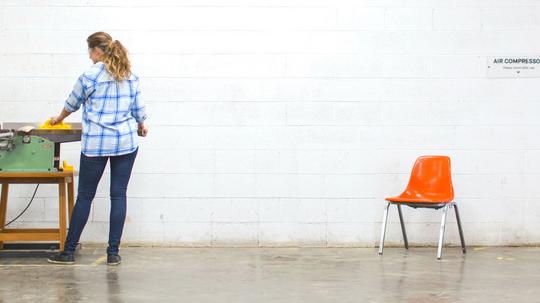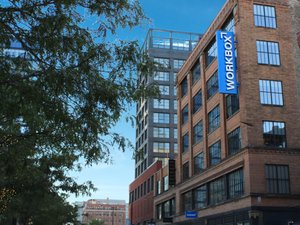
While working on a story on the rise of Chicago's maker-entrepreneurs, I found the community has a love-hate relationship with "maker."
Some wanted to distance themselves from the term, identifying more with more specific titles such as architect or designer or woodworker. Others see making and makers as more of a systemic approach to creating than an occupation or hobby.
The term maker has become synonymous with the larger Maker Movement, in which the DIY community branched into tech-enabled tinkering with tools such as 3D printers and Arduino kits. While maker spaces for tinkerers are still going strong, over time, the resources and technology for making have expanded to include software tools (such as CAD software), resources for business development (such as Kickstarter) and digital manufacturing, which has opened up the idea of a maker beyond just a hobbyist or tinkerer.
So in this new work of making, what makes a maker a maker? When does a maker graduate to maker pro? What constitutes a makerspace?
I gathered a few responses and thoughts from leaders of the maker and tech community on what exactly we're talking about when we talk about a maker.
Bill Fienup, managing director of mHUB: "I think the term has changed quite a bit over the past five years. Makers used to be more hobbyists, more tinkerers. Now that you can build a profession out of being a maker...A maker is anyone who is manufacturing a product, and on top of that, an entrepreneur who’s a maker is turning that product into a business."
The term maker used to refer to the geek
Craighton Berman, product designer and adjunct clinical instructor of industrial design at University of Illinois at Chicago: "It causes me to cringe a bit when someone calls me a maker. I think of myself as a designer. I do use making as part of the process. At the end of the day I'm taking a product and mass producing it, maybe not large scale but medium scale...I always think, oh makers don't do that. But place like [Lost Arts] are starting to redefine [a maker], starting to broaden the term maker a bit beyond hobbyists. There's more of a distinction between those who want to think about launching ideas, whether it’s a product or art, and people who actually want to get their hands in it at some part and have a physical outcome from it."
"I think the community becoming more of a physical space, not just an online space, has been huge and it's helped redefine what a maker is, and make the view of what a maker is for the general public a little more accessible and understandable."
Nuha Nazy, cofounder of Z-Axis Factory: "The term maker used to refer to the geek, the person who was fiddling with a combination of tech and product development, and I think maker has expanded at least in our view, to include anyone who is working with physical product. [There are] tech companies that are interested in IoT…then there are people who are just producing product that fulfills a niche."
Emilia Rogowska, cofounder of Z-Axis Factory: "More and more the makers are starting to really contribute more into sticking around with the business, they’re staring to make money in a business sense. Taking a specific thing and grow it from the first baby to it becoming a real business.
Charles Adler, cofounder of Kickstarter and founder of Center for Lost Arts: "If there was a term of a classic maker space, [Lost Arts] is not it. If the only definition is a maker space is the fact that I have a table saw and a 3D printer, then every shop in the US is effectively a maker space."
“Maybe the [maker spaces] of the past are simply about the tools and education around those tools, or facility and education around the facility. And the spaces of late are about greater conduit to support their greater success. The tool is one step. The orientation and education around skills with the tool is another step. But the greater potential [of] the project has been missing.”
"Truthfully I don't think about the definition of maker too often," he added over email. "In the communities I engage with, they're all creatives. People who constantly have new ideas, give shape to those ideas, and share them with others. Objects or digital. Art or product. Many are designers, artists, musicians, engineers, architects and entrepreneurs.
That being said, the difficulty I've seen is artists want to be seen as artists. Engineers want to be seen as engineers. Designers as designers, and so on. And this new term has come along to co-opt some of that self identification.
What we're doing at Lost Arts is supporting those broader disciplines, which I suppose would include makers.
So I don't know if the term is actually changing or if people just don't think about it very much. In the grand scheme of things I don't particularly think it matters. We've always had a thirst for creating, since the dawn of time. That's nothing new."
Elizabeth Koprucki, assistant director for the Polsky Center Fab Lab: "In one sense it’s that making is what people have been doing for thousands of years. In one sense, making is a self-identified subculture, where we do microcontrollers, we do 3D printing, we do robots, and we do drones. And there's a lot of valuable tech in there. That segment has really captured a lot of people's imaginations. Sometimes it's easier to shorthand what I do as 3D printing.
Making is an approach, learning by doing, learning by failing
"There's a process of iteration. There's a lot of people that do interesting things that don't identify with the people making robots. Making is an approach, learning by doing, learning by failing, iterating. All of that, more than the tools, where else can we apply that approach? [At the Polsky Center] it's the entrepreneurship."
Jessica Fong, public relations director at South Side Hackerspace: "The term maker is quite broad but it is also the most publicly friendly term that encompasses such a large and ever growing community of innovative thinkers and creators, so using it is a double edged sword. When you tell someone you're a hacker, the words ILLEGAL and CRIME flash through their eyes and they become visibly nervous. In actuality, it's the whole square-rectangle thing. Hackers are makers, but not all makers are necessarily hackers."
"There is a subtle cultural difference between a maker and a hacker. Hacker implies a willingness to try absolutely outrageous things just for the sake of trying them out. Hackers are associated with odd tastes in music and obscure internet references layered upon ten year old enduring memes."
"Whereas a maker is simply someone who puts things together to create something new. Anyone can be a hacker or a maker. You don't have to have a special set of skills. I think in this way, the word has shifted over time. Now, you could be a maker or a hacker and not even know it. It's about having the right mindset -- You're the kind of person who loves to explore, to create, to challenge the norm, and solve every day problems in unique, sometimes over-the-top, ways."
Note: Updated with additional comments from Adler.








